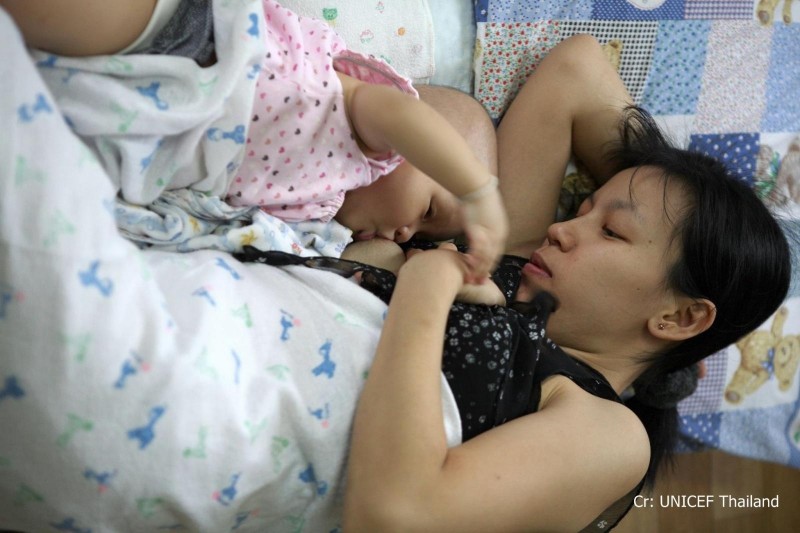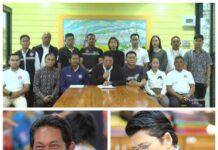จากกรณี แพทยสภา และกลุ่มกุมารแพทย์ออกมาแถลงจนกลายเป็นประเด็นร้อน ทำให้เกิดความเข้าใจว่านมแม่นั้นไม่ดี ส่งผลทำให้เด็กไม่แข็งแรง และเตี้ย เป็นผลทำให้ unicef และ who ต้องออกแถลงการณ์ร่วมอย่างด่วนวานนี้
แถลงการณ์ร่วม องค์การยูนิเซฟและองค์การอนามัยโลก ยืนยันสนับสนุน
ร่างพรบ. ควบคุมการส่งเสริมการตลาดอาหารทารกและเด็กเล็กในประเทศไทย
จากที่มีการรายงานข่าวเกี่ยวกับร่างพรบ. ควบคุมการส่งเสริมการตลาดอาหารทารกและเด็กเล็ก ซึ่งกำลังได้รับการพิจารณาในสภานิติบัญญัติแห่งชาติอยู่ในขณะนี้ องค์การยูนิเซฟ และองค์การอนามัยโลกขอกล่าวย้ำดังนี้
1. การควบคุมการส่งเสริมการตลาดอาหารสำหรับทารกและเด็กเล็ก อายุ 0-3 ปี เป็นมาตรฐานที่สากลยอมรับ และสอดคล้องกับหลักเกณฑ์สากลว่าด้วยอาหารทดแทนนมแม่ โดยเมื่อเดือนพฤษภาคม ที่ผ่านมา สมัชชาอนามัยโลกซึ่งประเทศไทยเป็นสมาชิกอยู่ด้วยนั้น ได้มีมติรับรอง แนวทางเพื่อหยุดการส่งเสริมอาหารทารกและเด็กเล็กอย่างไม่เหมาะสม ซึ่งได้ระบุชัดเจนว่า ไม่ควรมีการส่งเสริมการตลาดของอาหารทดแทนนมแม่ สำหรับทารกและเด็กเล็กอายุถึง 36 เดือน
2. หลักฐานทางวิทยาศาสตร์ทั่วโลกที่สนับสนุนการเลี้ยงลูกด้วยนมแม่นั้นชัดเจนมาก การเลี้ยงลูกด้วยนมแม่เป็นหนึ่งในวิธีสำคัญที่พ่อแม่จะป้องกันภาวะเตี้ยแคระแกร็นในเด็กได้ ตลอดจนเป็นการส่งเสริมพัฒนาการด้านสติปัญญาและด้านร่างกายของเด็ก นอกจากนี้ วารสารทางการแพทย์ The Lancet (2559) ยังแสดงให้เห็นว่า นมแม่มีความสัมพันธ์กับสติปัญญา (ไอคิว) ที่สูงขึ้นในเด็กและวัยรุ่น และการเลี้ยงลูกด้วยนมแม่ยังช่วยลดความเสี่ยงต่อมะเร็งเต้านมและมะเร็งรังไข่ของแม่อีกด้วย
ปัจจุบันอัตราการเลี้ยงลูกด้วยนมแม่อย่างเดียว 6 เดือนในประเทศไทยอยู่ในระดับที่ต่ำกว่าค่าเฉลี่ยของโลก และต่ำที่สุดในภูมิภาคเอเชียตะวันออกเฉียงใต้ ในขณะที่การส่งเสริมการตลาดของผลิตภัณฑ์อาหารทดแทนนมแม่เกิดขึ้นอย่างแพร่หลายและดุเดือด ดังนั้น การออกกฎหมายควบคุมการส่งเสริมการตลาดอาหารทารกและเด็กเล็ก จึงมีความสำคัญอย่างยิ่งและเป็นเรื่องเร่งด่วนที่สุด
ในขณะที่สภานิติบัญญัติแห่งชาติกำลังพิจารณาร่างกฎหมายฉบับนี้อยู่นั้น องค์การยูนิเซฟและองค์การอนามัยโลก จึงขอยืนยันจุดยืนในการสนับสนุนร่างพรบ. ควบคุมการส่งเสริมการตลาดอาหารทารกและเด็กเล็กในประเทศไทย
Joint Statement
UNICEF and WHO fully support proposed legislation on the control of Marketing of Breastmilk Substitutes in Thailand
In response to recent media reports on the proposed legislation on the control of Marketing of Breastmilk Substitutes (BMS) in Thailand, currently under consideration by the National Legislative Assembly, UNICEF and WHO would like to reiterate the following:
1. Regulation of marketing of breastmilk substitutes for children aged 0-3 years is the internationally accepted standard and is fully in line with the International Code of Marketing of Breastmilk Substitutes. The Guidance on Ending the Inappropriate Promotion of Foods for Infants and Young Children, adopted by the World Health Assembly (WHA) – of which Thailand is a member – in May 2016, clearly states that marketing should not take place for breastmilk substitutes for children up to the age of three years.
2. The global scientific evidence to support breastfeeding is clear and decisive. Breastfeeding is one of the most important and effective things that parents can do to prevent stunting, and promote the physical and cognitive development of their children. According to the recent findings of the Lancet (2016), breastfeeding is also consistently associated with higher levels of performance in intelligence tests among children and adolescents. Additionally, breastfeeding lowers the risk of breast cancer and ovarian cancer among mothers.
The rate of exclusive breastfeeding in Thailand is below the global average and the lowest in the South-East Asia Region, while aggressive marketing of breastmilk substitutes to mothers and families is widespread. The introduction of the BMS code into law is becoming ever more urgent.
UNICEF and WHO reiterate their strong support the introduction of the draft “Control of Marketing of Food for Infant and Young Children Act” currently under consideration by the National Legislative Assembly.




